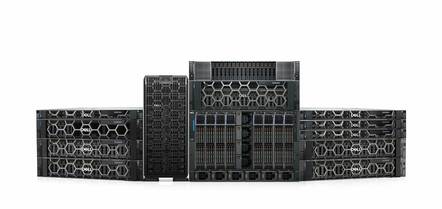This article is more than 1 year old
Dell rolls out 4th-Gen Xeon PowerEdge servers for cloud builders
They gotta keep the fluffy white stuff running, right?
Dell has lifted the covers off 13 freshly laid PowerEdge server systems, including models featuring Intel's 4th Generation Xeon Scalable CPUs, some tailored for cloud service providers, along with updated deployment and monitoring tools.
Like other system vendors, Dell is refreshing its portfolio with 4th-gen Xeon systems, Intel's first server platform to support DDR5 memory, the PCIe 5.0 bus, and the Compute Express Link (CXL) technology, offering the usual bump in performance.
That increase in performance includes up to 2.9x greater AI inferencing with the 4th Gen Xeon and its Intel Deep Learning Boost and Intel Advanced Matrix Extensions, according to Dell's benchmarks.
However, Dell said it will not support the new "Intel On Demand" capability of the 4th Gen Xeons designed to let organizations pay money to unlock certain capabilities, at least not at launch.
One segment specifically being targeted by the PowerEdge systems is cloud service providers, with new HS Series systems that will be delivered only via Dell's Hyperscale Next program.
"These are purpose-built servers that will help expand and build upon the core portfolio that we have today," said Dell's VP for Networking & Emerging Server Solutions, David Lincoln.
These servers include features such as OpenBMC support and front-facing I/O for cold aisle serviceability. CSP buyers will get a support line with one to one interaction with Dell technicians, we're told.
The PowerEdge HS Series will initially comprise the 1U HS5610, described as a "simplified, optimized and open platform for CSPs most popular applications," plus the 2U HS5620, which is "tailored for large-scale, heterogeneous datacenter environments with a broad selection of differentiated performance options."
Exact specifications have not been disclosed, however, and the systems are slated to be available globally from April.
New in Dell's general-purpose PowerEdge server systems are the R760, R660, and R760xa.
The R760, available from February, leads the two socket performance portfolio, Dell said, and it is this system that the 2.9x faster performance figure for AI inferencing applies to, when compared specifically with the previous generation R750.
The R760xa is designed for greater mainstream AI needs, according to Rajesh Pohani Dell's VP for PowerEdge. This is a "general purpose compute server optimized for AI workloads, and built for greater GPU density," he said, which will be able to support up to four double-width GPUs and up to 12 single-width GPUs.
"The entire portfolio is built with the higher performance of DDR five memory and PCIe Gen five, which doubles memory and I/O bandwidth respectively. We'll also introduce our next generation of RAID with our PERC 12 (PowerEdge RAID Controller) that more than doubles performance over the prior generation," Pohani said.
Also new in the four-socket server lineup is the 4U PowerEdge R960 and 2U R860, with the latter delivering "184 percent better performance than the past generation," according to Pohani.
The remainder of the next-generation Dell PowerEdge servers will be global availability throughout the first half of 2023, Dell said.
- Durham Uni and Dell co-design systems to help model the universe
- JEDEC reportedly set to formalize Dell laptop memory standard
- JEDEC reportedly set to formalize Dell laptop memory standard
- EU probes Broadcom/VMware deal over impact on hardware, not price hikes or cloudy concerns
These include the PowerEdge XE family, which ship with Nvidia H100 Tensor Core GPUs and the Nvidia AI Enterprise software suite. The XE9680 will be capable of fitting up to 8 Nvidia GPUs, while the XE8640 can be fitted with 4, and the XE9640 will be fitted with up to 4 of Intel's Data Center Max Series GPUs.
Later this year, Dell said it will expand the Apex on-demand portfolio to offer bare metal compute services, either at a customer premises, at the edge, or in colocation facilities. Services will be available through a monthly subscription, it said.
Dell also said it is continuing to improve its intelligent automation and systems management tools with enhancements to its iDRAC9 integrated management controller for Certificate Expiry Notice, telemetry for Dell Consoles and GPU monitoring. The Dell CloudIQ monitoring suite includes updates to server performance forecasting and new virtualization visualization. ®

